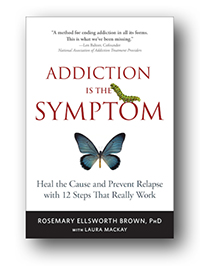Dr. Brown views things a little differently than you might be used to
 Addiction Is the Symptom has a full glossary of terms that makes for a handy compendium of the book and of Dr. Brown’s ideas. Here are some of the key definitions. Some of this may be a little hard to get your head around outside the context of the book, which connects it all, but I still think it will help—in general and as you read this blog. So here you go, almost straight from the book.
Addiction Is the Symptom has a full glossary of terms that makes for a handy compendium of the book and of Dr. Brown’s ideas. Here are some of the key definitions. Some of this may be a little hard to get your head around outside the context of the book, which connects it all, but I still think it will help—in general and as you read this blog. So here you go, almost straight from the book.
From Addiction to Symptom Substitution
- Addiction: Any person, process, substance, or situation over which we have lost choice or believe we cannot live without. An addiction is one expression of addictive behavior. Anything that you use to alter your mood or avoid your feelings can become addictive. Control is the original addiction.
- Addict: A person suffering from addiction has lost choice. He or she wants to permanently stop doing something self- or other-destructive, but can’t. Dr. Brown avoids the word addict, by which we define and even experience ourselves as a disease. It also assumes a chronic condition that can’t be healed, only treated, the best outcome being a perpetual state of recovery.
- Addictive behavior: Characterized by the complex of fear, control, and manipulation. Any attempt to use or control and manipulate that which is outside yourself—a person, process, substance, or situation—to meet internal needs. All addictive behaviors are symptoms of emotional dependency.
- Control: The imagined ability or power to manage, influence, or direct other people’s behavior or the course of events. Control is an illusion, one as deeply unquestioned as it is consequential. It is the original addiction, from which all others flow.
- Emotional dependency: Reliance on that which is outside ourselves for our emotional needs. It occurs because as children we do not learn to meet our own needs; rather, we learn to be dependent on “the other” (person, substance, situation) to meet them. It’s a using mentality. Triggers addictive behavior, i.e., fear, control, and manipulation.
- Fear, control, and manipulation: A survival mechanism; also known as addictive behavior. When we fear that we will not get what we need or want, this fear triggers control and manipulation of “the other” (person, substance, or situation) in an attempt to get it. When the object of our emotional dependency is withdrawn (or threatened to be), fear, control, and manipulation become even more intense, in proportion to the intensity of the dependency—our control efforts spin out of control.
- Healing: It’s much more than abstinence, although abstinence is required for healing. Within the context of addictive behavior, healing is a process—enabled by the Brown Method—that produces a qualitative change in the consciousness of the addicted person. This change restores choice. That is, it restores the ability to choose to avoid or disengage from any addictive behavior as it surfaces. The destination of healing is wholeness—a self-reliant state of being in which we can fully express ourselves spiritually, emotionally, intellectually, physically, and creatively, and therefore productively and financially. It’s a return to the self-actualization we knew at the very beginning of our lives.
- Insanity: Within the context of addictive behavior, insanity can be defined as the belief that you have any control over that which is outside yourself. It’s the continual attempt to get your needs met through control and manipulation of externals.
- Relapse: Slip, backslide, fall off the wagon. It’s what happens when you can’t stay stopped. The unfortunate norm in twelve-step programs. It’s traditionally defined as a return to using the substance of choice, but in truth, the substitution of a second, third, or fourth choice (of any addictive behavior) in order to maintain abstinence from the first is a form of relapse.
- Symptom substitution: The substitution of one form of addictive behavior for another (for example, sugar for alcohol, or dieting for overeating). Addicted people who are practicing symptom substitution often appear to be practicing abstinence, but they are actually in relapse. All addictions are symptoms of a single underlying problem, emotional dependency; therefore they serve the same function and are in practice more or less interchangeable. Symptom substitution—including her own—is among the topics Dr. Brown touches on in this 10-minute interview on Recovery Radio.




